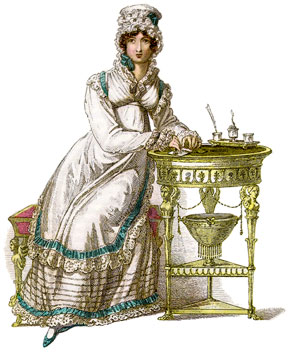
In the article "Jane Austen Changes Her Mind" Austen scholar Christopher Clausen questions the change of values shown in Persuasion. He argues that Austen had begun to realize the value of making a suitable match based on love and mutual compatibility rather than a marriage based on the social standards,which were evident in her earlier novels. In my opinion, however, that Austen's redefined her stories came from a certain point of her life that altered her previous views.
Through the study of her letters written to her family, Jane Austen herself was viewed in a role in social class, sometimes not as a writer. A neighboring friend of the Austen family, Mary Russell Mitford, prompted by a letter written to her from a Miss Hinton, passed along her view of Jane Austen's reputation in society to a baronet, Sir William Elford. She wrote, "...she was no more regarded in society than a poker or a fire or a fire screen or any other thin, upright piece of wood or iron that fills its corner in peace and quiet." It was noted that the author of such a remark was sister-in-law to a man who was in a lawsuit with Jane Austen's brother over an inheritance. However, individuals whose only purpose is to categorize each person in society had taken its hold on Austen, and its voice is heard through Anne Elliott in Austen's last novel Persuasion. This may be the reason for Austen's letter to her sister in which she writes about the character of Anne simply saying "She is almost too good for me" (Chapman 487).
Austen's final heroine, Anne Elliott, portrays the evolution Austen went through to achieve the conclusion in Persuasion of social justice and individual acceptance of others in different classes. Anne's initial "persuasion" to partially succumb to the influence of the aristocratic society lessens as she begins to fully comprehend the value of the emotional wealth of true friends, and moreover, true love. As she reunites with Captain Wentworth, of her own desire and not by her family's influence, she discovers that her high society family is inferior in every aspect.
The parallel of Anne's growth as a compassionate woman, to Austen's growth as a compassionate writer is felt immensely through the novel. To value virtue over vanity, cultural and class diversity over conformity is to be free from the narrow confines of the ignorant mind. This is ultimately Austen's powerful message.
Through the study of her letters written to her family, Jane Austen herself was viewed in a role in social class, sometimes not as a writer. A neighboring friend of the Austen family, Mary Russell Mitford, prompted by a letter written to her from a Miss Hinton, passed along her view of Jane Austen's reputation in society to a baronet, Sir William Elford. She wrote, "...she was no more regarded in society than a poker or a fire or a fire screen or any other thin, upright piece of wood or iron that fills its corner in peace and quiet." It was noted that the author of such a remark was sister-in-law to a man who was in a lawsuit with Jane Austen's brother over an inheritance. However, individuals whose only purpose is to categorize each person in society had taken its hold on Austen, and its voice is heard through Anne Elliott in Austen's last novel Persuasion. This may be the reason for Austen's letter to her sister in which she writes about the character of Anne simply saying "She is almost too good for me" (Chapman 487).
Austen's final heroine, Anne Elliott, portrays the evolution Austen went through to achieve the conclusion in Persuasion of social justice and individual acceptance of others in different classes. Anne's initial "persuasion" to partially succumb to the influence of the aristocratic society lessens as she begins to fully comprehend the value of the emotional wealth of true friends, and moreover, true love. As she reunites with Captain Wentworth, of her own desire and not by her family's influence, she discovers that her high society family is inferior in every aspect.
The parallel of Anne's growth as a compassionate woman, to Austen's growth as a compassionate writer is felt immensely through the novel. To value virtue over vanity, cultural and class diversity over conformity is to be free from the narrow confines of the ignorant mind. This is ultimately Austen's powerful message.

